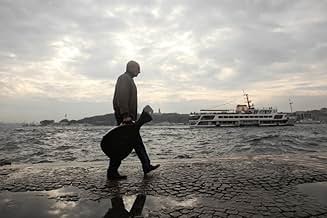At first glance, UNUTMA BENI ISTANBUL would seem to be drawing on several of the familiar tropes - both visual and literary - that are used to describe Istanbul's uniqueness: the winding streets, the little shops, the boats traveling across the Bosphorus, the tea-houses packed with inhabitants watching the world go by. It is only when we look at the identities of the filmmakers responsible for the seven short films that comprise this work that we understand its true political significance. They are Serbian, Greek, Hebrew, and Bosnian; and they look to Istanbul as a way of addressing their own particular conflicts, both ancient and modern: the Bosnian-Serb War, Greek-Turkish issues, the Arab-Israeli territorial and ethnic dispute. For them Istanbul provides a melting-pot of cultures and identities that might not help them to resolve their particular conflicts, but at least helps them to address the issues involved. Its particular history of tolerance and cultural pluralism, dating back centuries, provides a model example that other cultures might do well to follow. Inevitably there are some films within this portmanteau that are better than others: I especially liked OTELO, a short piece about an actress learning the true significance of Shakespeare's play by rehearsing with a Turkish barista. But perhaps the true significance of this film lies in the way filmmakers and other creative personnel in countries around Turkey (many of whom were in the old Ottoman Empire) have collaborated with one another to produce a brave and ultimately enlightening piece of work.































